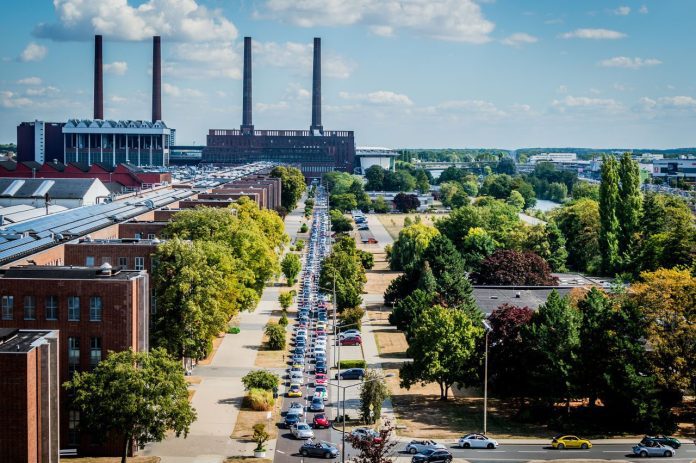It is a year late, but automotive giant Volkswagen has deployed a private 5G network at its main plant in Wolfsburg in Germany. Nokia has supplied the networking equipment for the project, which is being presented as a pilot, and utilizes the dedicated 3.7-3.8 GHz industrial band in Germany. Its installation comes two years – and one global pandemic – after the company said it expected to start in earnest on industrial 5G in 2020.
The network is being managed by Volkswagen, presumably with initial support from Nokia. “Volkswagen undertakes setup and operation of the 5G infrastructure itself in a move designed to build up competitive expertise in using this important technology of the future and ensure data security,” said a statement. It added: “Exclusive spectrum is a key enabler for 5G [in] manufacturing – interference-free, high-availability wireless transmissions require a dedicated frequency that will be used exclusively by Volkswagen for production purposes.”
The network covers the main “production development centre” and the “pilot hall; in the longer term, it will be expanded to cover large parts of the 6.5 square-kilometre plant site. The Wolfsburg plant is home to around 5,000 industrial robots, plus other machines and systems; Volkswagen said it expects 5G to deliver the kind of ultra latency and reliability (URLLC) to connect its production lines.
As well, Volkswagen said it has installed a “5G island” at its “pilot factory” in Dresden, where it is testing “innovative technologies in normal operation” for its new ID.3 series of electric vehicles. The Dresden site, formerly the company’s Centre for Future Mobility’, has been rebranded as the Transparent Factory, and given over to development of the ID.3 line.
Volkswagen is working at the site with Audi and Porsche, the group’s other automotive brands, as well as Dresden University of Technology; the group have received funding from the German Federal Ministry of Education and Research to develop networked control for a driverless transportation system, including usage of 5G to transfer “environmental data” at high speed between the system and the cloud.
Volkswagen said: “Latency is significantly reduced with 5G versus other wireless technologies such as WLAN (industrial WI-Fi)… This real-time wireless communication will make many smart factory applications possible for the first time… The pilot project will test whether 5G meets the requirements of vehicle production with a view to developing this for industrial series production in the future.
“One scenario to be tested in the pilot phase under real-life laboratory conditions in Wolfsburg is the wireless upload of data to manufactured vehicles. With ever higher levels of digitization and fully connected vehicles, the production process requires large amounts of data to be transmitted to the cars. 5G makes it possible to perform this much more quickly and at any time during production.”
The new deployments, both utilising the standalone (SA) versions of 5G NR standard, are part of Volkswagen’s new ACCELERATE strategy to drive digital change at the firm, centred around integration of software into cars. It follows the company’s long-term TRANSFORM 2025 strategy, from 2016, which underpinned its move to electric vehicles. “Volkswagen aims to transform itself into ‘the most attractive brand for sustainable mobility’,” it said.
Christian Vollmer, member of the board at Volkswagen, said: “In implementing our ACCELERATE strategy we are working at full speed to transform our Volkswagen sites into smart factories. Our goal is to continuously optimize our production and make it even more efficient and flexible. We believe that 5G technology has great potential for innovation, from the use of intelligent robots and driverless transportation systems to networked control of plant and machinery in real time up to wireless software flashing of manufactured vehicles.”
Beate Hofer, chief information officer at Volkswagen, said: “Efficient wireless communication in real time will be crucial for flexible production in the future. 5G has the potential to be one such driver of the Industrial Internet of Things. Our aim is therefore to build up extensive experience in the operation and industrial use of 5G technology.”
Volkswagen, the largest automaker by worldwide sales, said in 2019 it would start construction of its own 5G mobile networks in 122 factories in Germany in 2020. It was supposed to have issued a tender to network equipment vendors. The press noise followed the release of the dedicated 3.7-3.8 GHz band, initially in test mode, to enterprises, with the likes of Daimler and BMW, as well as industrial giants Bosh and Siemens all lining up for the action.
Volkswagen confirmed sizeable Industry 4.0 investments last year, as well, firming-up its interests in private industrial 5G as a means to factory automation and slicker production. Volkswagen announced “further” investment in digital technologies in Wolfsburg, following on from a €4 billion injection in digitalization in 2020 to go on ‘agile’ production, with a target of “at least” 2,000 new digital jobs through 2023.
The budget for skills and training, to bring its workforce up to speed with new analytics and automation technologies, was raised by €60 million to €160 million. It said at the time tasks will be eliminated as a result of “digitalization, process optimization, and organizational streamlining”. It wants a five per cent jump in productivity in the period at the same time.
Volkswagen said it will invest in the “middle double-digit millions range” in 2020; whether the figure is part of or additional to the existing €4 billion five-year digitalization budget is not clear. But it said progress in 2019 has seen it introduce automatic ultrasound inspections of welds on car bodies and make forward-steps with human-robot collaboration.

